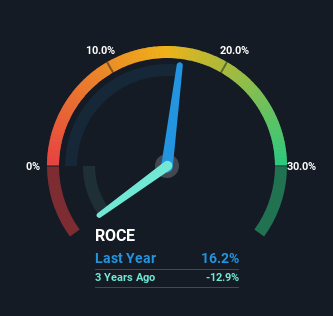- United Kingdom
- /
- Airlines
- /
- LSE:IAG
Returns On Capital At International Consolidated Airlines Group (LON:IAG) Have Hit The Brakes

If you're not sure where to start when looking for the next multi-bagger, there are a few key trends you should keep an eye out for. One common approach is to try and find a company with returns on capital employed (ROCE) that are increasing, in conjunction with a growing amount of capital employed. Ultimately, this demonstrates that it's a business that is reinvesting profits at increasing rates of return. That's why when we briefly looked at International Consolidated Airlines Group's (LON:IAG) ROCE trend, we were pretty happy with what we saw.
Understanding Return On Capital Employed (ROCE)
For those that aren't sure what ROCE is, it measures the amount of pre-tax profits a company can generate from the capital employed in its business. The formula for this calculation on International Consolidated Airlines Group is:
Return on Capital Employed = Earnings Before Interest and Tax (EBIT) ÷ (Total Assets - Current Liabilities)
0.16 = €3.5b ÷ (€43b - €21b) (Based on the trailing twelve months to September 2023).
So, International Consolidated Airlines Group has an ROCE of 16%. On its own, that's a standard return, however it's much better than the 12% generated by the Airlines industry.
View our latest analysis for International Consolidated Airlines Group

In the above chart we have measured International Consolidated Airlines Group's prior ROCE against its prior performance, but the future is arguably more important. If you'd like, you can check out the forecasts from the analysts covering International Consolidated Airlines Group here for free.
So How Is International Consolidated Airlines Group's ROCE Trending?
The trend of ROCE doesn't stand out much, but returns on a whole are decent. Over the past five years, ROCE has remained relatively flat at around 16% and the business has deployed 22% more capital into its operations. Since 16% is a moderate ROCE though, it's good to see a business can continue to reinvest at these decent rates of return. Over long periods of time, returns like these might not be too exciting, but with consistency they can pay off in terms of share price returns.
On a side note, International Consolidated Airlines Group's current liabilities are still rather high at 49% of total assets. This effectively means that suppliers (or short-term creditors) are funding a large portion of the business, so just be aware that this can introduce some elements of risk. Ideally we'd like to see this reduce as that would mean fewer obligations bearing risks.
Our Take On International Consolidated Airlines Group's ROCE
In the end, International Consolidated Airlines Group has proven its ability to adequately reinvest capital at good rates of return. Yet over the last five years the stock has declined 57%, so the decline might provide an opening. For that reason, savvy investors might want to look further into this company in case it's a prime investment.
If you want to know some of the risks facing International Consolidated Airlines Group we've found 2 warning signs (1 doesn't sit too well with us!) that you should be aware of before investing here.
If you want to search for solid companies with great earnings, check out this free list of companies with good balance sheets and impressive returns on equity.
New: AI Stock Screener & Alerts
Our new AI Stock Screener scans the market every day to uncover opportunities.
• Dividend Powerhouses (3%+ Yield)
• Undervalued Small Caps with Insider Buying
• High growth Tech and AI Companies
Or build your own from over 50 metrics.
Have feedback on this article? Concerned about the content? Get in touch with us directly. Alternatively, email editorial-team (at) simplywallst.com.
This article by Simply Wall St is general in nature. We provide commentary based on historical data and analyst forecasts only using an unbiased methodology and our articles are not intended to be financial advice. It does not constitute a recommendation to buy or sell any stock, and does not take account of your objectives, or your financial situation. We aim to bring you long-term focused analysis driven by fundamental data. Note that our analysis may not factor in the latest price-sensitive company announcements or qualitative material. Simply Wall St has no position in any stocks mentioned.
About LSE:IAG
International Consolidated Airlines Group
Engages in the provision of passenger and cargo transportation services in the North Atlantic, Latin America, the Caribbean, Europe, Africa, the Middle East, South Asia, the Asia Pacific, and internationally.
Undervalued with acceptable track record.
Similar Companies
Market Insights
Community Narratives



